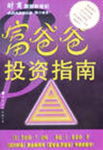富爸爸,穷爸爸(英文版)-第18章
按键盘上方向键 ← 或 → 可快速上下翻页,按键盘上的 Enter 键可回到本书目录页,按键盘上方向键 ↑ 可回到本页顶部!
————未阅读完?加入书签已便下次继续阅读!
or 〃your home is an asset。〃 〃Your home is your biggest investment。〃 〃You get a tax break for going into greater debt。〃 〃Get a safe job。〃 〃Don't make mistakes。〃 〃Don't take risks。〃
It is said that the fear of public speaking is a fear greater than death for most people。 According to psychiatrists; the fear of public speaking is caused by the fear of ostracism; the fear of standing out; the fear of criticism; the fear of ridicule; the fear of being an outcast。 The fear of being different prevents most people from seeking new ways to solve their problems。
That is why my educated dad said the Japanese valued the power of the mirror the most; for it is only when we as humans look into the mirror do we find truth。 And the main reason that most people say 〃Play it safe1' is out of fear。 That goes for anything; be it sports; relationships; career; money。
It is that same fear; the fear of ostracism that causes people to conform and not question monly accepted opinions or popular trends。 〃Your home is an asset。〃 〃Get a bill consolidation loan and get out of debt。〃 〃Work harder。〃 〃It's a promotion。〃 〃Someday I'll be a vice president。〃 〃Save money。〃 〃When ! get a raise; I'll buy us a bigger house。〃 〃Mutual funds are safe。〃 〃Tickle Me Elmo dolls are out of stock; but I just happen to have one in back that another customer has not e by for yet。〃
Many great financial problems are caused by going along with the crowd and trying to keep up with the Joneses。 Occasionally; we all need to look in the mirror and be true to our inner wisdom rather than our fears。
By the time Mike and I were 16 years old; we began to have problems in school。 We were not bad kids。 We just began to separate from the crowd。 We worked for Mike's dad after school and on the weekends。 Mike and I often spent hours after work just sitting at a table with his dad while he held meetings with his bankers; attorneys; accountants; brokers; investors; managers and employees。 Here was a man who had left school at the age of 13; now directing; instructing; ordering and asking questions of educated people。 They came at his beck and call; and cringed when he did not approve of them。
Here was a man who had not gone along with the crowd。 He was a man who did his own thinking and detested the words; 〃We have to do it this way because that's the way everyone else does it。〃 He also hated the word 〃can't。〃 If you wanted him to do something; just say; 〃I don't think
you can do it。〃
Mike and I learned more sitting at his meetings than we did in all our years of school; college included。 Mike's dad was not school educated; but he was financially educated and successful as a result。 He use to tell us over and over again。 〃An intelligent person hires people who are more intelligent than they are。〃 So Mike and I had the benefit of spending hours listening to and; in the process; learning From
intelligent people。
But because of this; both Mike and I just could not go along with the standard dogma that our teachers preached; And that caused the problems。 Whenever the teacher said; 〃If you don't get good grades; you won't do well in the real world;〃 Mike and I just raised our eyebrows。 When we were told to follow set procedures and not deviate from the rules; we could see how this schooling process actually discouraged creativity。 We started to understand why our rich dad told us that schools were designed to produce good employees instead of employers。
Occasionally Mike or I would ask our teachers how what we studied was applicable; or we asked why we never studied money and how it worked。 To the later question; we often got the answer that money was not important; that if we excelled in our education; the money would follow。
The more we knew about the power of money; the more distant we grew from the teachers and our classmates。
My highly educated dad never pressured me about my grades。 I often wondered why。 But we did begin to argue about money。 By the time I was 16; I probably had a far better foundation with money than both my mom and dad。 I could keep books; I listened to tax accountants; corporate attorneys; bankers; real estate brokers; investors and so forth。 My dad talked to teachers。
One day; my dad was telling me why our home was his greatest investment。 A not…too…pleasant argument took place when I showed him why I thought a house was not a good investment。
The following diagram illustrates the difference in perception between my rich dad and my poor dad when it came to their homes。 One dad thought his house was an asset; and the other dad thought it was a liability。
I remember when I drew a diagram for my dad showing him the direction of cash flow。 I also showed him the ancillary expenses that went along with owning the home。 A bigger home meant bigger expenses; and the cash flow kept going out through the expense column。
Today; I am still challenged on the idea of a house not being an asset。 And 1 know that for many people; it is their dream as well as their largest investment。 And owning your own home is better than nothing。 I simply offer an alternate way of looking at this popular dogma。 If my wife and I were to buy a bigger; more flashy house we realize it would not be an asset; it would be a liability; since it would take money out of
our pocket。
So here is the argument I put forth。 I really do not expect most people to agree with it because a nice home is an emotional thing。 And when it es to money; high emotions tend to lower financial intelligence。 1 know from personal experience that money has a way of making every decision emotional。
1。 When it es to houses; I point out that most people work all their lives paying for a home they never own。 In other words; most people buy a new house every so many years; each time incurring a new 30…year loan to pay off the previous one。
2。 Even though people receive a tax deduction for interest on mortgage payments; they pay for all their other expenses with after…tax dollars。 Even after they pay off their mortgage。
3。 Property taxes。 My wife's parents were shocked when the property taxes on their home went to 1;000 a month。 This was after they had retired; so the increase put a strain on their retirement budget; and they felt forced to move。
4 Houses do not always go up in value。 In 1997; I still have friends who owe a million dollars for a home that will today sell for only 700;000。
5。 The greatest losses of all are those from missed opportunities。 If all your money is tied up in your house; you may be forced to work harder because your money continues blowing out of the expense column; instead of adding to the asset column; the classic middle class cash flow pattern。 If a young couple would put more money into their asset column early on; their later years would get easier; especially as they prepared to send their children to college。 Their assets would have grown and would be available to help cover expenses。 All too often; a house only serves as a vehicle for incurring a home…equity loan to pay for mounting expenses。 In summary; the end result in making a decision to own a house that is too expensive in lieu of starting an investment portfolio early on impacts an individual in at least the





